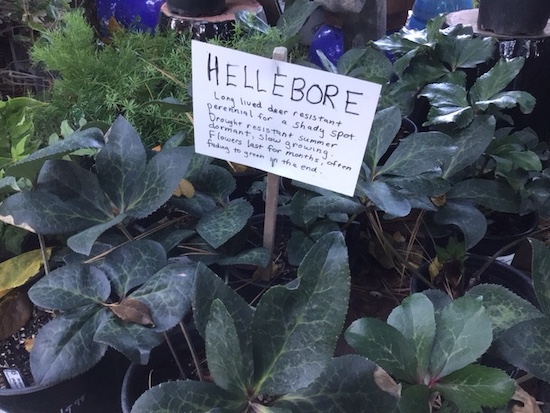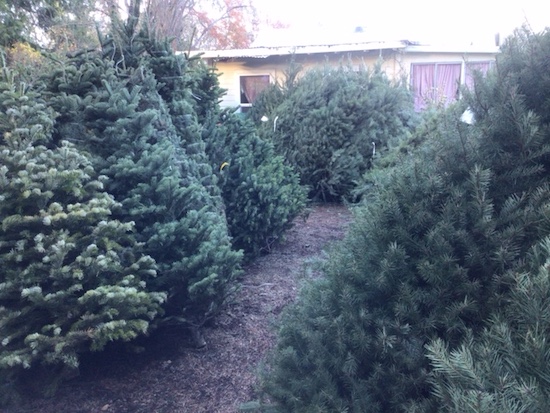
The holidays are upon us, and the big news here is Christmas. The cut trees are in stock now.
| Doug Firs | Nordmanns and Nobles |
|
|
Doug Firs do drop some needles. That is normal. I have three big ones growing here, and even in the ground, they drop all year. They smell the best and grow faster than the more expensive varieties. Also, we get them directly from the supplier, and he has to broker in the others for us.
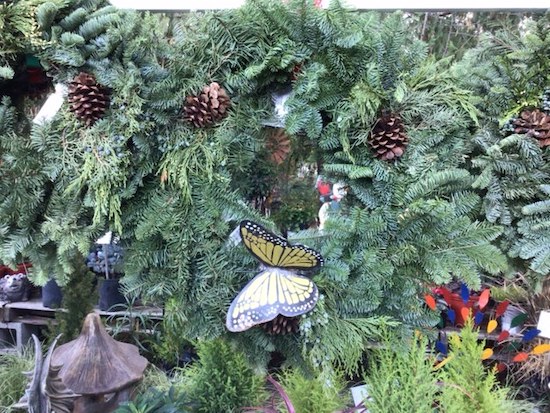
We have potted living trees if you want to go that route. The drawback to a living tree is that it can not be in the house for long. The stated time is a week to 10 days, but in our milder climate, I think we are safe to stretch that to two weeks. One customer told me they had theirs in for a month, and it was okay. Obviously, they did not let it dry out and their house was not kept too warm and the tree away from a heat source. Once it is moved outside again, we recommend putting it in a protected spot for a few weeks before you move out to an unprotected area. This will transition the tree better. We also recommend some shade cloth next summer if the tree is in full sun to get it used to the harsh summers here.
We have lots of colorful Christmas plants like Points, Cyclamen, and Cactus. Cone topiary of Rosemary, Euonymus, and Boxwood for outside, along with small tabletop Alberta Spruce, Gaultheria, and Lemon Cypress, round out our living selection. Wreaths are $39 and $49, and to really spruce up your entrance or mantel, there is cedar garland for $2.99/ft. We have holiday-themed garden art, too.
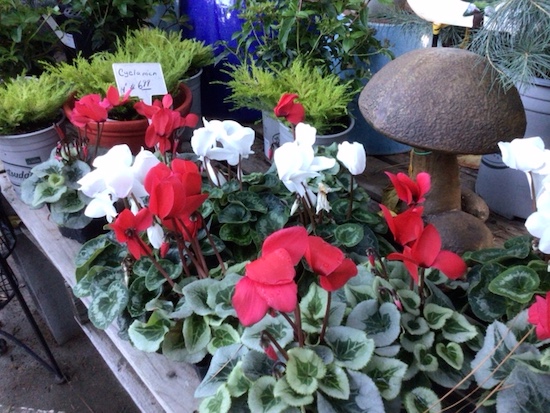
We have had quite a few folks wondering about 2024 fruit. The berries, grapes, pomegranates, some mulberry, gojis, currants, wisteria, and named varieties of lilacs are due to be delivered on Dec. 8th. These are the plants grown in the tall, narrow pots that we call liners. The rest of the true bare root do not come until the first half of January. We are taking pre-orders for the trees we have on order. (We are already sold out of Nevada Chestnut.) Below is the link to see what is on order for this year.
https://www.wheretobuy.davewilson.com/home-gardens/retailer-variety-list/star-gardens
December is our big sale month. We put the entire nursery on sale except for Oregon-grown cut and potted conifers (Christmas trees), wreaths, and garland. You can save 25% on all our regular inventory til we close on December 24th for 3 weeks. This means that all our iron, pots, benches, arches, trellis’, garden art, wind chimes, and statuary, along with plants, are on sale in December. We even offer gift certificates for 25% off that are valid after Jan 1st. Some people buy these for themselves to spend next spring, and they make great gifts for the gardeners in your life.
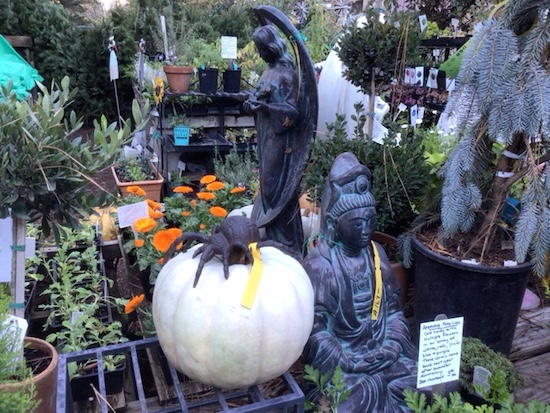
The weather is still cooperating for planting trees, hardy perennials, and shrubs. We have had some rain to soften the soil up, but not enough to saturate it. It is not recommended to plant if the soil is too wet because working it under those conditions can damage the soil structure, leaving it too packed with no space for oxygen and water. Good soil structure is 50% combo of loam, clay, and sand and 50% space for 25% oxygen and 25% water. The reason heavy clay soil can be problematic is the structure of clay is very tight, holds water longer, and does not leave space for oxygen. Your plants drown in the classic sense of the word, no air. I have the opposite problem where the greenhouse is down on the lower part of the nursery. The creek ran there at one time in the far, far past, and it is gravelly loam that does not hold moisture at all. It drains too fast.
I just recently read an article about calcium and disease resistance. It is becoming common practice in the greenhouse-grown floral industry, where disease, especially Botrytis, is a big problem, to use a calcium spray. They often combine it with another fungicide and are moving more and more to biofungicides. Both of these stimulate the plants natural defense against pathogens. I believe I talked about one of these biofungicides we sell here in a past newsletter. Bonide sells it as Revitalize, but we are switching to the Ferti-Lome label for a lot of our sprays. (An American-owned company. Bonide no longer is.) They label it Fungicide-5, and it is OMRI (Organic Materials Research Institute) approved for all of us organic gardeners. We also sell liquid calcium.
Winter can feel a little bleak and colorless, but it has its own beauty. This is my favorite time to walk the dogs in the creek bed with all the more subtle colors of the bare branches in a variety of hues of browns, reds, and grey. Our stately Oaks really stand out in winter. In our landscapes, we might have plants that actually look their best in the coming few months. One of these is Viburnum tinus. The stems turn red on this climate-appropriate evergreen shrub, and the flower buds are already forming, making it a great winter selection. Another are the red and yellow twig dogwood shrubs and the Sangu Kaku Japanese maples. The bark gets winter color and can be a stand out this time of year. The mottled bark on your crepe myrtle, along with the dried seed heads, and another dimension to these plants. Hellebores (aka Lenten or Christmas Rose) are in stock now, with long-lasting flowers soon to form. This is another good climate-appropriate deer-resistant plant. Nandinas get red winter tints to their foliage in the winter sun. Ornamental quince starts blooming as early as the end of January. Euphorbias are another plant putting on growth now for an early bloom, and that looks good in winter. We have a good selection of spring-blooming bulbs still available, too.
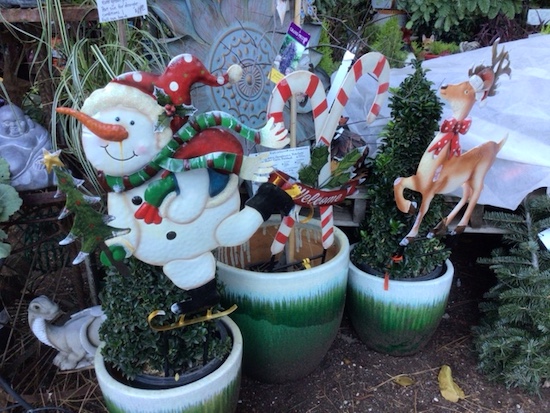
Year’s End, and this one seemed to whiz by. As I write this, it looks like another beautiful day. I am feeling blessed to live here, especially since I get to experience Star Gardens every day.
Star Gardens will be closed from
Dec. 25 thru Jan. 11.
December Special
25% off
Gift Certificates valid for 2024.
All our trees, shrubs, bulbs, seeds, perennials and annuals.
All soils, sprays, and fertilizer.
All pots and pottery, chimes, and garden art.
And anything else you find.
Exceptions are Oregon-grown potted conifers, cut trees, wreaths, and garland.
